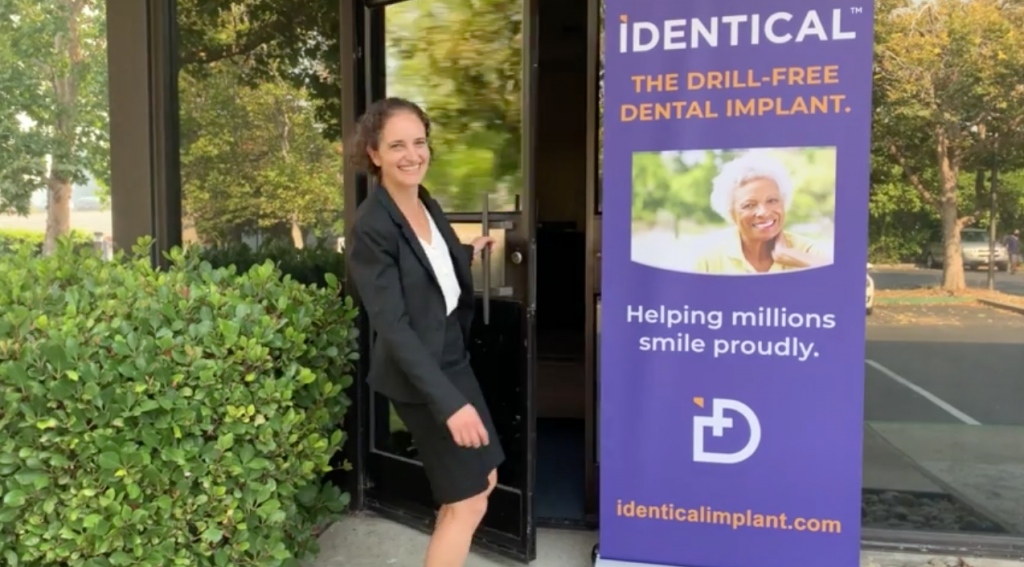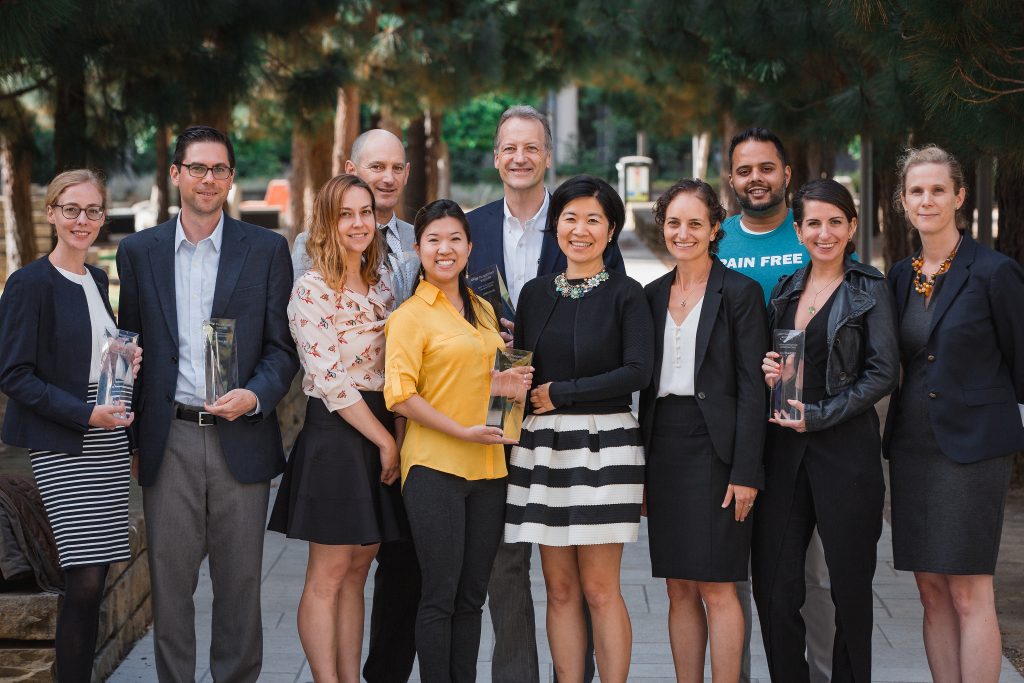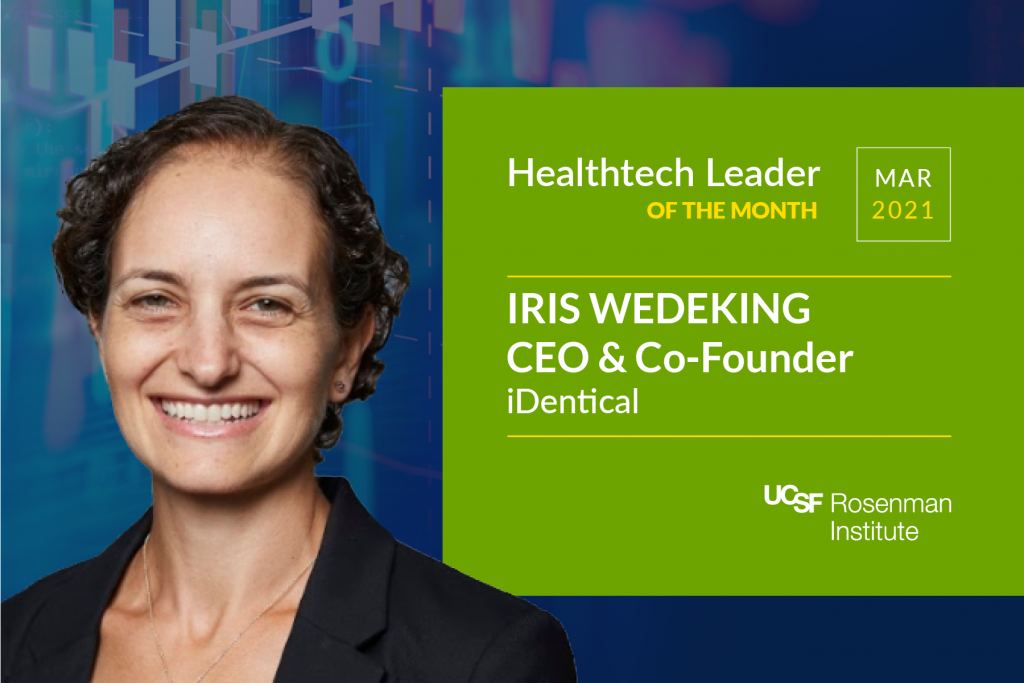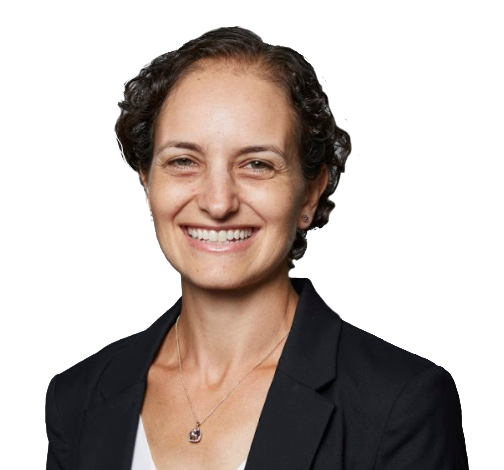For the second installment of the Healthtech Leader of the Month series, we interviewed Iris Wedeking, CEO and co-founder of iDentical, maker of the iDenticalTM personalized, drill-free dental implant. Iris shared a few of her insights from her journey into the medical device community.
For our first post in the series, we spoke to Matt Likens, CEO of GT Medical Technologies. Let’s dive in.
iDentical Aims to Democratize Dental Implants
iDentical, part of the Rosenman Innovators program since 2019, is developing a dental implant that removes the drill from the equation. For patients, a traditional dental implant requires an invasive and arduous process; for dentists, becoming trained to place implants requires hundreds of hours of additional training after dental school. Iris and her husband, dentist Todd Wedeking, founded iDentical with the mission of making dental implants more accessible for both dentists and patients.

Iris Wedeking at the iDentical office in Mountain View, CA.
Her Journey into Healthtech: 3 Lessons Learned
Iris began her career working for Stanford University’s Hillel, where she founded Camp Kesem: a student-run summer camp program for children whose parents have cancer. Now in its twentieth year, Kesem has expanded into a national nonprofit with 137 chapters across 44 states. “That was my first foray into entrepreneurship, where I learned how to identify a major unmet need and then scale a program to meet that need,” Iris recounts. After founding Kesem, she earned her MBA from UC Berkeley and worked in marketing research at The Clorox Company. “After eight years at Clorox, I had gained incredibly valuable business and marketing skills and felt the need to utilize these skills to make more of a positive impact in the world,” she says. Thus began Iris’ journey into the medical device community. Here are a few things she’s learned:
Lesson #1: Identifying a need is the first step to identifying a solution.
Back in 2016, Iris and Todd ran three dental implant centers across the Bay Area. They struggled to find enough dentists trained in implant dentistry to staff their offices and to meet patient demand. Todd had an inspiration: a drill-free process would enable general dentists to place implants without extensive training and would be less traumatic for patients. He began to develop a drill-free dental implant as a side project, working on “evenings and weekends, whenever he had time to think about it,” Iris says.
Lesson #2: Invest in your idea.
Todd invested in the equipment he needed to create prototypes and selected eight patients who needed extractions to test out implants for a short period. Rather than manufacture an implant with a traditional spiral screw into the jawbone, he used 3-D scanning and CAD modeling to create titanium implants that matched the unique root shape of the extracted tooth. He placed the implants, and a week later, found that in all patients, the implant was remarkably stable in the socket site. “It was one of those light bulb moments where I thought, if we could bring this drill-free dental implant technology to the market, we would eliminate the problem we faced with finding dentists trained in implant dentistry, since any general dentist could place a drill-free dental implant,” he says. “At the same time, patients would be able to receive implants at a lower cost with a far less invasive procedure.”
Lesson #3: Surround yourself with people who have the skills and expertise that you don’t have.
Iris and Todd incorporated iDentical in 2018 with the mission of making dental implants more accessible to all. As they continue to grow, Iris draws from her Camp Kesem experience. “It’s important to surround yourself with people who have the skills and expertise that you don’t have, which allows you to build a robust team,” she says. “I’m also a big believer in building teams that are aligned to a common goal and inspired by a shared vision.” In 2019, iDentical joined the Rosenman Innovators program, which helped them to grow with advisors and investors, assemble an R&D team, and raise $4.6 million in capital in 2020.
Welcome to the Healthtech Neighborhood: Final Thoughts
Iris describes how joining the Rosenman Innovators program has supported the growth of iDentical and her own growth as a CEO: “I was told, ‘We want you to feel like you have a community you can call on when you need help.’ I felt like I was new to the neighborhood of medtech, and they made me feel like people would be warm and welcoming on this journey.”
Iris says that their path forward is clear: “Everyone working on iDentical shares this vision of democratizing dental implants. The technology exists to make a huge transformation in dentistry.” iDentical seeks to bring their implants to the market and revolutionize the process of implantation for patients and dentists alike.
Become a Better Healthtech Entrepreneur: Join Our Vibrant Community.
“The Rosenman Institute does a great job of building community and bringing support and resources to healthtech entrepreneurs. I just attended a webinar they put on about public speaking… Even though I’ve pitched now hundreds of times, it’s always great to learn some tips on how to best tell your story, especially in this Zoom world.”
-Iris Wedeking

Rosenman Innovators awardees in 2019.
You’re not alone in your mission to bring better health technology to patients and medical professionals. Now more than ever, connecting with a global community of entrepreneurs is an invaluable step towards realizing your goals within the health technology world.
Receive invitations to free and paid virtual events with healthtech entrepreneurs, payers, and service providers when you subscribe to our newsletter.

